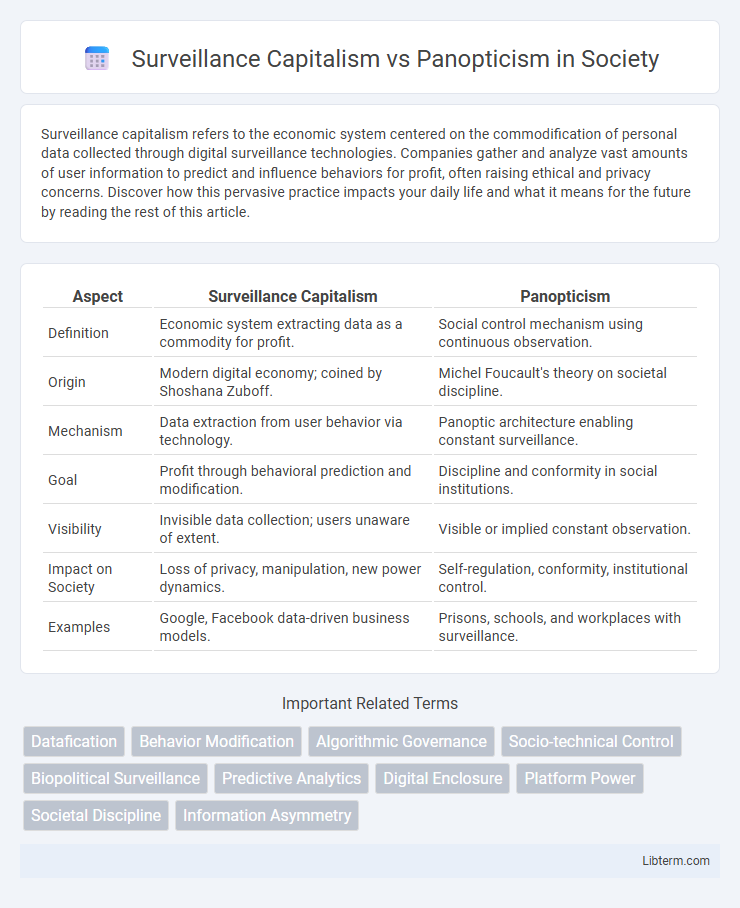Surveillance capitalism refers to the economic system centered on the commodification of personal data collected through digital surveillance technologies. Companies gather and analyze vast amounts of user information to predict and influence behaviors for profit, often raising ethical and privacy concerns. Discover how this pervasive practice impacts your daily life and what it means for the future by reading the rest of this article.
Table of Comparison
| Aspect | Surveillance Capitalism | Panopticism |
|---|---|---|
| Definition | Economic system extracting data as a commodity for profit. | Social control mechanism using continuous observation. |
| Origin | Modern digital economy; coined by Shoshana Zuboff. | Michel Foucault's theory on societal discipline. |
| Mechanism | Data extraction from user behavior via technology. | Panoptic architecture enabling constant surveillance. |
| Goal | Profit through behavioral prediction and modification. | Discipline and conformity in social institutions. |
| Visibility | Invisible data collection; users unaware of extent. | Visible or implied constant observation. |
| Impact on Society | Loss of privacy, manipulation, new power dynamics. | Self-regulation, conformity, institutional control. |
| Examples | Google, Facebook data-driven business models. | Prisons, schools, and workplaces with surveillance. |
Introduction to Surveillance Capitalism
Surveillance capitalism is an economic system centered on the commodification of personal data, where corporations extract, analyze, and monetize individuals' behavioral information through digital platforms. This model leverages advanced algorithms and machine learning to predict and influence consumer behavior, transforming private experiences into data-driven profit streams. Originating from the tech industry's expansion, surveillance capitalism poses significant challenges to privacy and autonomy in the digital age.
Defining Panopticism in Modern Society
Panopticism in modern society refers to a structural form of social control where individuals regulate their own behavior due to the pervasive possibility of being observed, echoing Michel Foucault's concept of the Panopticon prison. This form of surveillance extends beyond physical spaces into digital environments, where constant monitoring by institutions and corporations shapes personal identities and behaviors. Contemporary Panopticism intertwines with digital technologies, producing self-discipline through data surveillance, thereby reinforcing power dynamics without direct coercion.
Historical Roots: From Bentham’s Panopticon to Digital Surveillance
Surveillance capitalism traces its origins to the digital age's exploitation of personal data for profit, evolving from the panopticism concept introduced by Jeremy Bentham's Panopticon, a prison design emphasizing constant visibility as a means of control. Bentham's Panopticon established a model for disciplinary power through surveillance that Michel Foucault later expanded, highlighting how visibility induces self-regulation. The transition from physical panoptic structures to digital surveillance systems demonstrates the shift from institutional control to pervasive data-driven monitoring embedded in modern capitalist economies.
Mechanisms of Control: Technology and Power
Surveillance capitalism harnesses big data analytics and algorithmic prediction to monetize personal information, exerting control through targeted advertising and behavior modification. Panopticism employs architectural design and constant visibility to induce self-regulation and discipline within social institutions. Both frameworks utilize technological power to shape individual actions but differ in mechanisms: surveillance capitalism relies on digital data extraction and market incentives, while panopticism emphasizes physical surveillance and hierarchical observation.
Data Extraction: Commodification vs Observation
Surveillance capitalism transforms personal data into commodified assets by extracting and monetizing behavioral information for profit-driven algorithms and targeted advertising. Panopticism centers on continuous observation and control, where individuals modify behavior due to the awareness of being watched, emphasizing power dynamics over economic gain. Both frameworks highlight mechanisms of data extraction, but commodification in surveillance capitalism contrasts with the disciplinary observation in panopticism.
The Role of Tech Corporations in Surveillance Capitalism
Tech corporations drive surveillance capitalism by harvesting extensive user data to predict and modify behavior for profit, creating personalized advertising ecosystems. Unlike panopticism's centralized power structure, these companies operate through decentralized, algorithmic monitoring embedded in everyday digital interactions. This data commodification fuels unprecedented influence over consumer choices and societal norms.
Social Implications of Panoptic Surveillance
Panoptic surveillance creates a social environment of continuous observation, leading to self-regulation and conformity due to the internalized perception of being watched. This dynamic erodes privacy, fosters social anxiety, and alters interpersonal behaviors, often reinforcing power imbalances and social hierarchies. The pervasive visibility in panopticism amplifies issues of social control, limiting dissent and individual autonomy within communities.
Resistance, Agency, and Privacy in the Digital Age
Surveillance capitalism exploits personal data to shape behavior, contrasting with panopticism's top-down surveillance model, both challenging individual agency and privacy in the digital age. Resistance emerges through digital literacy, encryption tools, and advocacy for data rights, empowering users to reclaim control over their information. Privacy frameworks like GDPR and initiatives promoting decentralized platforms underscore efforts to balance technological advancement with human autonomy and protection.
Policy, Regulation, and Ethical Considerations
Surveillance capitalism exploits personal data for profit, necessitating robust policy frameworks that enforce transparency, user consent, and data protection to mitigate privacy infringements. Panopticism's surveillance model, rooted in constant observation, raises ethical concerns about autonomy and social control, prompting regulatory measures to balance security with individual rights. Effective regulation requires international cooperation and ethical guidelines that address data ownership, algorithmic accountability, and corporate responsibility in both paradigms.
Future Trajectories: Convergence and Divergence
Surveillance capitalism leverages big data and algorithmic prediction to monetize personal information, evolving toward increasingly sophisticated forms of behavioral modification, while panopticism relies on hierarchical observation to enforce social discipline through visible or presumed surveillance. Future trajectories show convergence as both systems integrate digital technologies, enhancing real-time data collection and control mechanisms across physical and virtual spaces. Divergence arises in their foundational goals: surveillance capitalism prioritizes profit-driven data exploitation, whereas panopticism emphasizes power dynamics and social order maintenance, influencing their respective regulatory and ethical responses.
Surveillance Capitalism Infographic

 libterm.com
libterm.com